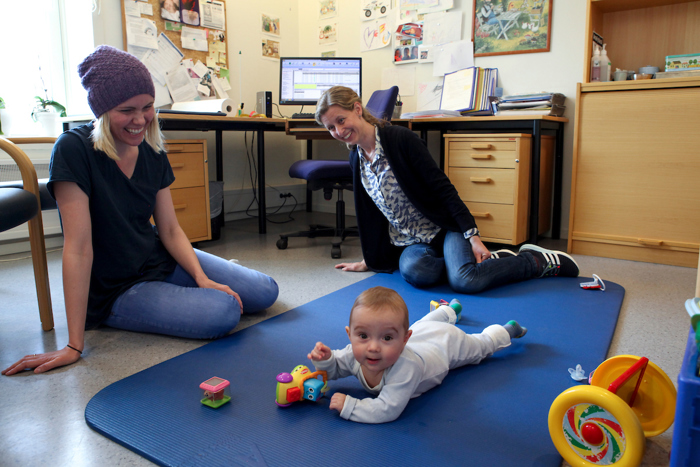What is the infant healthcare programme, age 0–5 years?
The infant healthcare programme at the health centre is a health-promoting and multidisciplinary service, with a public health nurse and a GP. The centre should also have a physiotherapist and may have a psychologist. The staff is covered by a duty of confidentiality.
The comprehensive programme offers health check-ups, vaccination, home visit, health information and advice.
Most of the services at the health centre is carried out by public health nurses. They are educated nurses with additional training in health promotion and preventive work for children and young people.
The health centre collaborates, among others, with GPs, other services for children and young people in the municipality and the specialist health service.
How to contact the health centre
The health centre should be easily available for children and parents. You can always contact or show up at the health centre without an appointment.
Should you need their services before your scheduled home visit or between the regular consultations, you can make direct contact with the health service in your municipality.
The next consultation for the child will be agreed from one consultation to the other, or you will receive an invitation to the consultation by post or phone (text message). Some municipalities send a digital invitation via Helsenorge
Your municipality’s website should give contact information to your health centre.
What happens at the health centre?
The health centre offers regular consultations according to a standardised programme of 14 consultations. The first consultation is a home visit for newborns. The consultations at the health centre are carried out until the child is four years old. Some of the regular consultations are set up as group consultations. It is possible to choose an individual consultation instead.
The purpose of the infant healthcare programme is to contribute to increased health literacy and reassure parents in their role as a parent. This means that the public health nurse speaks to all parents about issues such as the importance of interaction between parents and children, sleep, nutrition and the children's general development. Themes can also include drug use, violence and neglect. You can also bring up other topics you need to talk about.
At the consultations the child will be weighed and measured (height, length and head circumference). Vaccinations are carried out in accordance with the Norwegian Childhood Immunisation Programme.
Several health centres facilitate groups where new parents may team up, in Norwegian called "barselgrupper". You can contact the health centre to find out if they make such initiatives.
Regular health checkups at the health centre
- When the child is 7-10 days (home visit)
- When the child is 4 weeks
- When the child is 6 weeks
- When the child is 3 months
- When the child is 4 months
- When the child is 5 months
- When the child is 6 months
- When the child is 8 months
- When the child is 10 months
- When the child is 12 months
- When the child is 15 months
- When the child is 17-18 months
- When the child is 2 years
- When the child is 4 years
Your child is entitled to health check-ups
Your child is entitled to health check-ups by law. As a parent, you are legally obliged to make sure your child gets the health checks. The services provided by the infant healthcare programme help to ensure that children receive the support they are entitled to.
You are responsible for notifying the health centre if you move to another municipality or country.
You may also read:
